- Home
- Charlotte Bronte
Shirley
Shirley Read online
Produced by Brenda Lewis, Fox in the Stars and the OnlineDistributed Proofreading Canada Team athttps://www.pgdpcanada.net
Moore placed his hand on his cousin's shoulder, stooped,and left a kiss on her forehead.]
SHIRLEY
BY CHARLOTTE BRONTE
T. Nelson & Sons
CONTENTS.
I. LEVITICAL 3
II. THE WAGONS 16
III. MR. YORKE 31
IV. MR. YORKE (CONTINUED) 40
V. HOLLOW'S COTTAGE 51
VI. CORIOLANUS 66
VII. THE CURATES AT TEA 85
VIII. NOAH AND MOSES 110
IX. BRIARMAINS 125
X. OLD MAIDS 147
XI. FIELDHEAD 164
XII. SHIRLEY AND CAROLINE 181
XIII. FURTHER COMMUNICATIONS ON BUSINESS 201
XIV. SHIRLEY SEEKS TO BE SAVED BY WORKS 226
XV. MR. DONNE'S EXODUS 239
XVI. WHITSUNTIDE 253
XVII. THE SCHOOL FEAST 264
XVIII. WHICH THE GENTEEL READER IS RECOMMENDED TO SKIP, LOW PERSONS BEING HERE INTRODUCED 279
XIX. A SUMMER NIGHT 290
XX. TO-MORROW 306
XXI. MRS. PRYOR 319
XXII. TWO LIVES 336
XXIII. AN EVENING OUT 346
XXIV. THE VALLEY OF THE SHADOW OF DEATH 365
XXV. THE WEST WIND BLOWS 384
XXVI. OLD COPY-BOOKS 392
XXVII. THE FIRST BLUESTOCKING 410
XXVIII. PHOEBE 433
XXIX. LOUIS MOORE 453
XXX. RUSHEDGE--A CONFESSIONAL 461
XXXI. UNCLE AND NIECE 475
XXXII. THE SCHOOLBOY AND THE WOOD-NYMPH 491
XXXIII. MARTIN'S TACTICS 502
XXXIV. CASE OF DOMESTIC PERSECUTION--REMARKABLE INSTANCE OF PIOUS PERSEVERANCE IN THE DISCHARGE OF RELIGIOUS DUTIES 513
XXXV. WHEREIN MATTERS MAKE SOME PROGRESS, BUT NOT MUCH 521
XXXVI. WRITTEN IN THE SCHOOLROOM 534
XXXVII. THE WINDING-UP 555
SHIRLEY.
CHAPTER I.
LEVITICAL.
Of late years an abundant shower of curates has fallen upon the north ofEngland: they lie very thick on the hills; every parish has one or moreof them; they are young enough to be very active, and ought to be doinga great deal of good. But not of late years are we about to speak; weare going back to the beginning of this century: late years--presentyears are dusty, sunburnt, hot, arid; we will evade the noon, forget itin siesta, pass the midday in slumber, and dream of dawn.
If you think, from this prelude, that anything like a romance ispreparing for you, reader, you never were more mistaken. Do youanticipate sentiment, and poetry, and reverie? Do you expect passion,and stimulus, and melodrama? Calm your expectations; reduce them to alowly standard. Something real, cool, and solid lies before you;something unromantic as Monday morning, when all who have work wake withthe consciousness that they must rise and betake themselves thereto. Itis not positively affirmed that you shall not have a taste of theexciting, perhaps towards the middle and close of the meal, but it isresolved that the first dish set upon the table shall be one that aCatholic--ay, even an Anglo-Catholic--might eat on Good Friday inPassion Week: it shall be cold lentils and vinegar without oil; it shallbe unleavened bread with bitter herbs, and no roast lamb.
Of late years, I say, an abundant shower of curates has fallen upon thenorth of England; but in eighteen-hundred-eleven-twelve that affluentrain had not descended. Curates were scarce then: there was no PastoralAid--no Additional Curates' Society to stretch a helping hand toworn-out old rectors and incumbents, and give them the wherewithal topay a vigorous young colleague from Oxford or Cambridge. The presentsuccessors of the apostles, disciples of Dr. Pusey and tools of thePropaganda, were at that time being hatched under cradle-blankets, orundergoing regeneration by nursery-baptism in wash-hand basins. Youcould not have guessed by looking at any one of them that theItalian-ironed double frills of its net-cap surrounded the brows of apreordained, specially-sanctified successor of St. Paul, St. Peter, orSt. John; nor could you have foreseen in the folds of its longnight-gown the white surplice in which it was hereafter cruelly toexercise the souls of its parishioners, and strangely to nonplus itsold-fashioned vicar by flourishing aloft in a pulpit the shirt-likeraiment which had never before waved higher than the reading-desk.
Yet even in those days of scarcity there were curates: the preciousplant was rare, but it might be found. A certain favoured district inthe West Riding of Yorkshire could boast three rods of Aaron blossomingwithin a circuit of twenty miles. You shall see them, reader. Step intothis neat garden-house on the skirts of Whinbury, walk forward into thelittle parlour. There they are at dinner. Allow me to introduce them toyou: Mr. Donne, curate of Whinbury; Mr. Malone, curate of Briarfield;Mr. Sweeting, curate of Nunnely. These are Mr. Donne's lodgings, beingthe habitation of one John Gale, a small clothier. Mr. Donne has kindlyinvited his brethren to regale with him. You and I will join the party,see what is to be seen, and hear what is to be heard. At present,however, they are only eating; and while they eat we will talk aside.
These gentlemen are in the bloom of youth; they possess all the activityof that interesting age--an activity which their moping old vicars wouldfain turn into the channel of their pastoral duties, often expressing awish to see it expended in a diligent superintendence of the schools,and in frequent visits to the sick of their respective parishes. But theyouthful Levites feel this to be dull work; they prefer lavishing theirenergies on a course of proceeding which, though to other eyes it appearmore heavy with _ennui_, more cursed with monotony, than the toil ofthe weaver at his loom, seems to yield them an unfailing supply ofenjoyment and occupation.
I allude to a rushing backwards and forwards, amongst themselves, to andfrom their respective lodgings--not a round, but a triangle of visits,which they keep up all the year through, in winter, spring, summer, andautumn. Season and weather make no difference; with unintelligible zealthey dare snow and hail, wind and rain, mire and dust, to go and dine,or drink tea, or sup with each other. What attracts them it would bedifficult to say. It is not friendship, for whenever they meet theyquarrel. It is not religion--the thing is never named amongst them;theology they may discuss occasionally, but piety-
-never. It is not thelove of eating and drinking: each might have as good a joint andpudding, tea as potent, and toast as succulent, at his own lodgings, asis served to him at his brother's. Mrs. Gale, Mrs. Hogg, and Mrs.Whipp--their respective landladies--affirm that "it is just for naughtelse but to give folk trouble." By "folk" the good ladies of course meanthemselves, for indeed they are kept in a continual "fry" by this systemof mutual invasion.
Mr. Donne and his guests, as I have said, are at dinner; Mrs. Gale waitson them, but a spark of the hot kitchen fire is in her eye. Sheconsiders that the privilege of inviting a friend to a mealoccasionally, without additional charge (a privilege included in theterms on which she lets her lodgings), has been quite sufficientlyexercised of late. The present week is yet but at Thursday, and onMonday Mr. Malone, the curate of Briarfield, came to breakfast andstayed dinner; on Tuesday Mr. Malone and Mr. Sweeting of Nunnely came totea, remained to supper, occupied the spare bed, and favoured her withtheir company to breakfast on Wednesday morning; now, on Thursday, theyare both here at dinner, and she is almost certain they will stay allnight. "C'en est trop," she would say, if she could speak French.
Mr. Sweeting is mincing the slice of roast beef on his plate, andcomplaining that it is very tough; Mr. Donne says the beer is flat. Ay,that is the worst of it: if they would only be civil Mrs. Gale wouldn'tmind it so much, if they would only seem satisfied with what they getshe wouldn't care; but "these young parsons is so high and so scornful,they set everybody beneath their 'fit.' They treat her with less thancivility, just because she doesn't keep a servant, but does the work ofthe house herself, as her mother did afore her; then they are alwaysspeaking against Yorkshire ways and Yorkshire folk," and by that verytoken Mrs. Gale does not believe one of them to be a real gentleman, orcome of gentle kin. "The old parsons is worth the whole lump of collegelads; they know what belongs to good manners, and is kind to high andlow."
"More bread!" cries Mr. Malone, in a tone which, though prolonged but toutter two syllables, proclaims him at once a native of the land ofshamrocks and potatoes. Mrs. Gale hates Mr. Malone more than either ofthe other two; but she fears him also, for he is a tall, strongly-builtpersonage, with real Irish legs and arms, and a face as genuinelynational--not the Milesian face, not Daniel O'Connell's style, but thehigh-featured, North-American-Indian sort of visage, which belongs to acertain class of the Irish gentry, and has a petrified and proud look,better suited to the owner of an estate of slaves than to the landlordof a free peasantry. Mr. Malone's father termed himself a gentleman: hewas poor and in debt, and besottedly arrogant; and his son was like him.
Mrs. Gale offered the loaf.
"Cut it, woman," said her guest; and the "woman" cut it accordingly. Hadshe followed her inclinations, she would have cut the parson also; herYorkshire soul revolted absolutely from his manner of command.
The curates had good appetites, and though the beef was "tough," theyate a great deal of it. They swallowed, too, a tolerable allowance ofthe "flat beer," while a dish of Yorkshire pudding, and two tureens ofvegetables, disappeared like leaves before locusts. The cheese, too,received distinguished marks of their attention; and a "spice-cake,"which followed by way of dessert, vanished like a vision, and was nomore found. Its elegy was chanted in the kitchen by Abraham, Mrs. Gale'sson and heir, a youth of six summers; he had reckoned upon the reversionthereof, and when his mother brought down the empty platter, he liftedup his voice and wept sore.
The curates, meantime, sat and sipped their wine, a liquor ofunpretending vintage, moderately enjoyed. Mr. Malone, indeed, would muchrather have had whisky; but Mr. Donne, being an Englishman, did not keepthe beverage. While they sipped they argued, not on politics, nor onphilosophy, nor on literature--these topics were now, as ever, totallywithout interest for them--not even on theology, practical or doctrinal,but on minute points of ecclesiastical discipline, frivolities whichseemed empty as bubbles to all save themselves. Mr. Malone, whocontrived to secure two glasses of wine, when his brethren contentedthemselves with one, waxed by degrees hilarious after his fashion; thatis, he grew a little insolent, said rude things in a hectoring tone, andlaughed clamorously at his own brilliancy.
Each of his companions became in turn his butt. Malone had a stock ofjokes at their service, which he was accustomed to serve out regularlyon convivial occasions like the present, seldom varying his wit; forwhich, indeed, there was no necessity, as he never appeared to considerhimself monotonous, and did not at all care what others thought. Mr.Donne he favoured with hints about his extreme meagreness, allusions tohis turned-up nose, cutting sarcasms on a certain threadbare chocolatesurtout which that gentleman was accustomed to sport whenever it rainedor seemed likely to rain, and criticisms on a choice set of cockneyphrases and modes of pronunciation, Mr. Donne's own property, andcertainly deserving of remark for the elegance and finish theycommunicated to his style.
Mr. Sweeting was bantered about his stature--he was a little man, a mereboy in height and breadth compared with the athletic Malone; rallied onhis musical accomplishments--he played the flute and sang hymns like aseraph, some young ladies of his parish thought; sneered at as "theladies' pet;" teased about his mamma and sisters, for whom poor Mr.Sweeting had some lingering regard, and of whom he was foolish enoughnow and then to speak in the presence of the priestly Paddy, from whoseanatomy the bowels of natural affection had somehow been omitted.
The victims met these attacks each in his own way: Mr. Donne with astilted self-complacency and half-sullen phlegm, the sole props of hisotherwise somewhat rickety dignity; Mr. Sweeting with the indifferenceof a light, easy disposition, which never professed to have any dignityto maintain.
When Malone's raillery became rather too offensive, which it soon did,they joined, in an attempt to turn the tables on him by asking him howmany boys had shouted "Irish Peter!" after him as he came along the roadthat day (Malone's name was Peter--the Rev. Peter Augustus Malone);requesting to be informed whether it was the mode in Ireland forclergymen to carry loaded pistols in their pockets, and a shillelah intheir hands, when they made pastoral visits; inquiring the significationof such words as vele, firrum, hellum, storrum (so Mr. Malone invariablypronounced veil, firm, helm, storm), and employing such other methods ofretaliation as the innate refinement of their minds suggested.
This, of course, would not do. Malone, being neither good-natured norphlegmatic, was presently in a towering passion. He vociferated,gesticulated; Donne and Sweeting laughed. He reviled them as Saxons andsnobs at the very top pitch of his high Celtic voice; they taunted himwith being the native of a conquered land. He menaced rebellion in thename of his "counthry," vented bitter hatred against English rule; theyspoke of rags, beggary, and pestilence. The little parlour was in anuproar; you would have thought a duel must follow such virulent abuse;it seemed a wonder that Mr. and Mrs. Gale did not take alarm at thenoise, and send for a constable to keep the peace. But they wereaccustomed to such demonstrations; they well knew that the curates neverdined or took tea together without a little exercise of the sort, andwere quite easy as to consequences, knowing that these clerical quarrelswere as harmless as they were noisy, that they resulted in nothing, andthat, on whatever terms the curates might part to-night, they would besure to meet the best friends in the world to-morrow morning.
As the worthy pair were sitting by their kitchen fire, listening to therepeated and sonorous contact of Malone's fist with the mahogany planeof the parlour table, and to the consequent start and jingle ofdecanters and glasses following each assault, to the mocking laughter ofthe allied English disputants, and the stuttering declamation of theisolated Hibernian--as they thus sat, a foot was heard on the outerdoor-step, and the knocker quivered to a sharp appeal.
Mr. Gale went and opened.
"Whom have you upstairs in the parlour?" asked a voice--a ratherremarkable voice, nasal in tone, abrupt in utterance.
"O Mr. Helstone, is it you, sir? I could hardly see you for thedarkness; it is so soon dark now. Will you walk
in, sir?"
"I want to know first whether it is worth my while walking in. Whom haveyou upstairs?"
"The curates, sir."
"What! all of them?"
"Yes, sir."
"Been dining here?"
"Yes, sir."
"That will do."
With these words a person entered--a middle-aged man, in black. Hewalked straight across the kitchen to an inner door, opened it, inclinedhis head forward, and stood listening. There was something to listen to,for the noise above was just then louder than ever.
"Hey!" he ejaculated to himself; then turning to Mr. Gale--"Have youoften this sort of work?"
Mr. Gale had been a churchwarden, and was indulgent to the clergy.
"They're young, you know, sir--they're young," said he deprecatingly.
"Young! They want caning. Bad boys--bad boys! And if you were aDissenter, John Gale, instead of being a good Churchman, they'd do thelike--they'd expose themselves; but I'll----"
By way of finish to this sentence, he passed through the inner door,drew it after him, and mounted the stair. Again he listened a fewminutes when he arrived at the upper room. Making entrance withoutwarning, he stood before the curates.
And they were silent; they were transfixed; and so was the invader.He--a personage short of stature, but straight of port, and bearing onbroad shoulders a hawk's head, beak, and eye, the whole surmounted by aRehoboam, or shovel hat, which he did not seem to think it necessary tolift or remove before the presence in which he then stood--_he_ foldedhis arms on his chest and surveyed his young friends, if friends theywere, much at his leisure.
"What!" he began, delivering his words in a voice no longer nasal, butdeep--more than deep--a voice made purposely hollow andcavernous--"what! has the miracle of Pentecost been renewed? Have thecloven tongues come down again? Where are they? The sound filled thewhole house just now. I heard the seventeen languages in full action:Parthians, and Medes, and Elamites, the dwellers in Mesopotamia, and inJudea, and Cappadocia, in Pontus and Asia, Phrygia and Pamphylia, inEgypt and in the parts of Libya about Cyrene, strangers of Rome, Jewsand proselytes, Cretes and Arabians; every one of these must have hadits representative in this room two minutes since."
"I beg your pardon, Mr. Helstone," began Mr. Donne; "take a seat, pray,sir. Have a glass of wine?"
His civilities received no answer. The falcon in the black coatproceeded,--
"What do I talk about the gift of tongues? Gift, indeed! I mistook thechapter, and book, and Testament--gospel for law, Acts for Genesis, thecity of Jerusalem for the plain of Shinar. It was no gift but theconfusion of tongues which has gabbled me deaf as a post. _You_,apostles? What! you three? Certainly not; three presumptuous Babylonishmasons--neither more nor less!"
"I assure you, sir, we were only having a little chat together over aglass of wine after a friendly dinner--settling the Dissenters!"
"Oh! settling the Dissenters, were you? Was Malone settling theDissenters? It sounded to me much more like settling his co-apostles.You were quarrelling together, making almost as much noise--you threealone--as Moses Barraclough, the preaching tailor, and all his hearersare making in the Methodist chapel down yonder, where they are in thethick of a revival. I know whose fault it is.--It is yours, Malone."
"Mine, sir?"
"Yours, sir. Donne and Sweeting were quiet before you came, and would bequiet if you were gone. I wish, when you crossed the Channel, you hadleft your Irish habits behind you. Dublin student ways won't do here.The proceedings which might pass unnoticed in a wild bog and mountaindistrict in Connaught will, in a decent English parish, bring disgraceon those who indulge in them, and, what is far worse, on the sacredinstitution of which they are merely the humble appendages."
There was a certain dignity in the little elderly gentleman's manner ofrebuking these youths, though it was not, perhaps, quite the dignitymost appropriate to the occasion. Mr. Helstone, standing straight as aramrod, looking keen as a kite, presented, despite his clerical hat,black coat, and gaiters, more the air of a veteran officer chiding hissubalterns than of a venerable priest exhorting his sons in the faith.Gospel mildness, apostolic benignity, never seemed to have breathedtheir influence over that keen brown visage, but firmness had fixed thefeatures, and sagacity had carved her own lines about them.
"I met Supplehough," he continued, "plodding through the mud this wetnight, going to preach at Milldean opposition shop. As I told you, Iheard Barraclough bellowing in the midst of a conventicle like apossessed bull; and I find _you_, gentlemen, tarrying over yourhalf-pint of muddy port wine, and scolding like angry old women. Nowonder Supplehough should have dipped sixteen adult converts in aday--which he did a fortnight since; no wonder Barraclough, scamp andhypocrite as he is, should attract all the weaver-girls in their flowersand ribbons, to witness how much harder are his knuckles than the woodenbrim of his tub; as little wonder that _you_, when you are left toyourselves, without your rectors--myself, and Hall, and Boultby--to backyou, should too often perform the holy service of our church to barewalls, and read your bit of a dry discourse to the clerk, and theorganist, and the beadle. But enough of the subject. I came to seeMalone.--I have an errand unto thee, O captain!"
"What is it?" inquired Malone discontentedly. "There can be no funeralto take at this time of day."
"Have you any arms about you?"
"Arms, sir?--yes, and legs." And he advanced the mighty members.
"Bah! weapons I mean."
"I have the pistols you gave me yourself. I never part with them. I laythem ready cocked on a chair by my bedside at night. I have myblackthorn."
"Very good. Will you go to Hollow's Mill?"
"What is stirring at Hollow's Mill?"
"Nothing as yet, nor perhaps will be; but Moore is alone there. He hassent all the workmen he can trust to Stilbro'; there are only two womenleft about the place. It would be a nice opportunity for any of hiswell-wishers to pay him a visit, if they knew how straight the path wasmade before them."
"I am none of his well-wishers, sir. I don't care for him."
"Soh! Malone, you are afraid."
"You know me better than that. If I really thought there was a chanceof a row I would go: but Moore is a strange, shy man, whom I neverpretend to understand; and for the sake of his sweet company only Iwould not stir a step."
"But there _is_ a chance of a row; if a positive riot does not takeplace--of which, indeed, I see no signs--yet it is unlikely this nightwill pass quite tranquilly. You know Moore has resolved to have newmachinery, and he expects two wagon-loads of frames and shears fromStilbro' this evening. Scott, the overlooker, and a few picked men aregone to fetch them."
"They will bring them in safely and quietly enough, sir."
"Moore says so, and affirms he wants nobody. Some one, however, he musthave, if it were only to bear evidence in case anything should happen. Icall him very careless. He sits in the counting-house with the shuttersunclosed; he goes out here and there after dark, wanders right up thehollow, down Fieldhead Lane, among the plantations, just as if he werethe darling of the neighbourhood, or--being, as he is, itsdetestation--bore a 'charmed life,' as they say in tale-books. He takesno warning from the fate of Pearson, nor from that of Armitage--shot,one in his own house and the other on the moor."
"But he should take warning, sir, and use precautions too," interposedMr. Sweeting; "and I think he would if he heard what I heard the otherday."
"What did you hear, Davy?"
"You know Mike Hartley, sir?"
"The Antinomian weaver? Yes."
"When Mike has been drinking for a few weeks together, he generallywinds up by a visit to Nunnely vicarage, to tell Mr. Hall a piece of hismind about his sermons, to denounce the horrible tendency of hisdoctrine of works, and warn him that he and all his hearers are sittingin outer darkness."
"Well, that has nothing to do with Moore."
"Besides being an Antinomian, he is a violent Jacobin and leveller,sir."
"I know. When he is very drunk, his mind is always running on regicide.Mike is not unacquainted with history, and it is rich to hear him goingover the list of tyrants of whom, as he says, 'the revenger of blood hasobtained satisfaction.' The fellow exults strangely in murder done oncrowned heads or on any head for political reasons. I have alreadyheard it hinted that he seems to have a queer hankering after Moore. Isthat what you allude to, Sweeting?"
"You use the proper term, sir. Mr. Hall thinks Mike has no personalhatred of Moore. Mike says he even likes to talk to him and run afterhim, but he has a _hankering_ that Moore should be made an example of.He was extolling him to Mr. Hall the other day as the mill-owner withthe most brains in Yorkshire, and for that reason he affirms Mooreshould be chosen as a sacrifice, an oblation of a sweet savour. Is MikeHartley in his right mind, do you think, sir?" inquired Sweeting simply.
"Can't tell, Davy. He may be crazed, or he may be only crafty, orperhaps a little of both."
"He talks of seeing visions, sir."
"Ay! He is a very Ezekiel or Daniel for visions. He came just when I wasgoing to bed last Friday night to describe one that had been revealed tohim in Nunnely Park that very afternoon."
"Tell it, sir. What was it?" urged Sweeting.
"Davy, thou hast an enormous organ of wonder in thy cranium. Malone, yousee, has none. Neither murders nor visions interest him. See what a bigvacant Saph he looks at this moment."
"Saph! Who was Saph, sir?"
"I thought you would not know. You may find it out. It is biblical. Iknow nothing more of him than his name and race; but from a boy upwardsI have always attached a personality to Saph. Depend on it he washonest, heavy, and luckless. He met his end at Gob by the hand ofSibbechai."
"But the vision, sir?"
"Davy, thou shalt hear. Donne is biting his nails, and Malone yawning,so I will tell it but to thee. Mike is out of work, like many others,unfortunately. Mr. Grame, Sir Philip Nunnely's steward, gave him a jobabout the priory. According to his account, Mike was busy hedging ratherlate in the afternoon, but before dark, when he heard what he thoughtwas a band at a distance--bugles, fifes, and the sound of a trumpet; itcame from the forest, and he wondered that there should be music there.He looked up. All amongst the trees he saw moving objects, red, likepoppies, or white, like may-blossom. The wood was full of them; theypoured out and filled the park. He then perceived they weresoldiers--thousands and tens of thousands; but they made no more noisethan a swarm of midges on a summer evening. They formed in order, heaffirmed, and marched, regiment after regiment, across the park. Hefollowed them to Nunnely Common; the music still played soft anddistant. On the common he watched them go through a number ofevolutions. A man clothed in scarlet stood in the centre and directedthem. They extended, he declared, over fifty acres. They were in sighthalf an hour; then they marched away quite silently. The whole time heheard neither voice nor tread--nothing but the faint music playing asolemn march."
"Where did they go, sir?"
"Towards Briarfield. Mike followed them. They seemed passing Fieldhead,when a column of smoke, such as might be vomited by a park of artillery,spread noiseless over the fields, the road, the common, and rolled, hesaid, blue and dim, to his very feet. As it cleared away he looked againfor the soldiers, but they were vanished; he saw them no more. Mike,like a wise Daniel as he is, not only rehearsed the vision but gave theinterpretation thereof. It signifies, he intimated, bloodshed and civilconflict."
"Do you credit it, sir?" asked Sweeting.
"Do you, Davy?--But come, Malone; why are you not off?"
"I am rather surprised, sir, you did not stay with Moore yourself. Youlike this kind of thing."
"So I should have done, had I not unfortunately happened to engageBoultby to sup with me on his way home from the Bible Society meeting atNunnely. I promised to send you as my substitute; for which, by-the-bye,he did not thank me. He would much rather have had me than you, Peter.Should there be any real need of help I shall join you. The mill-bellwill give warning. Meantime, go--unless (turning suddenly to Messrs.Sweeting and Donne)--unless Davy Sweeting or Joseph Donne prefersgoing.--What do you say, gentlemen? The commission is an honourable one,not without the seasoning of a little real peril; for the country is ina queer state, as you all know, and Moore and his mill and his machineryare held in sufficient odium. There are chivalric sentiments, there ishigh-beating courage, under those waistcoats of yours, I doubt not.Perhaps I am too partial to my favourite Peter. Little David shall bethe champion, or spotless Joseph.--Malone, you are but a greatfloundering Saul after all, good only to lend your armour. Out with yourfirearms; fetch your shillelah. It is there--in the corner."
With a significant grin Malone produced his pistols, offering one toeach of his brethren. They were not readily seized on. With gracefulmodesty each gentleman retired a step from the presented weapon.
"I never touch them. I never did touch anything of the kind," said Mr.Donne.
"I am almost a stranger to Mr. Moore," murmured Sweeting.
"If you never touched a pistol, try the feel of it now, great satrap ofEgypt. As to the little minstrel, he probably prefers encountering thePhilistines with no other weapon than his flute.--Get their hats, Peter.They'll both of 'em go."
"No, sir; no, Mr. Helstone. My mother wouldn't like it," pleadedSweeting.
"And I make it a rule never to get mixed up in affairs of the kind,"observed Donne.
Helstone smiled sardonically; Malone laughed a horse-laugh. He thenreplaced his arms, took his hat and cudgel, and saying that "he neverfelt more in tune for a shindy in his life, and that he wished a scoreof greasy cloth-dressers might beat up Moore's quarters that night," hemade his exit, clearing the stairs at a stride or two, and making thehouse shake with the bang of the front-door behind him.

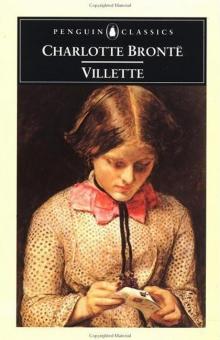 Villette
Villette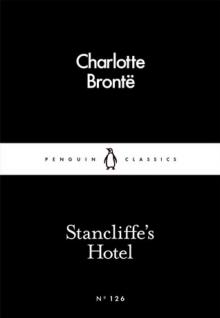 Stancliffe's Hotel
Stancliffe's Hotel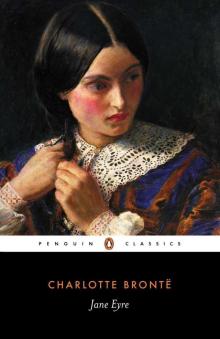 Jane Eyre
Jane Eyre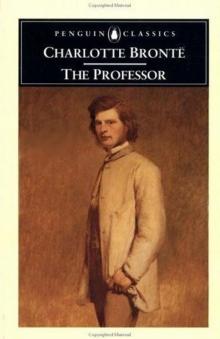 The Professor
The Professor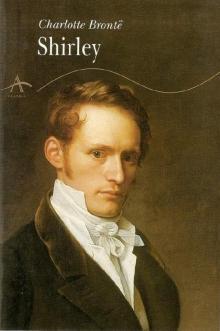 Shirley
Shirley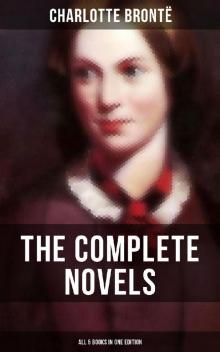 The Complete Novels of Charlotte Brontë
The Complete Novels of Charlotte Brontë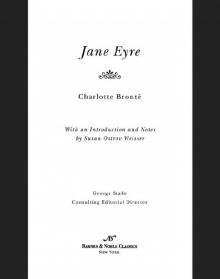 Jane Eyre (Barnes & Noble Classics Series)
Jane Eyre (Barnes & Noble Classics Series)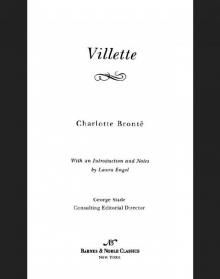 Villette (Barnes & Noble Classics Series)
Villette (Barnes & Noble Classics Series)